#occupation of the ruhr
Text
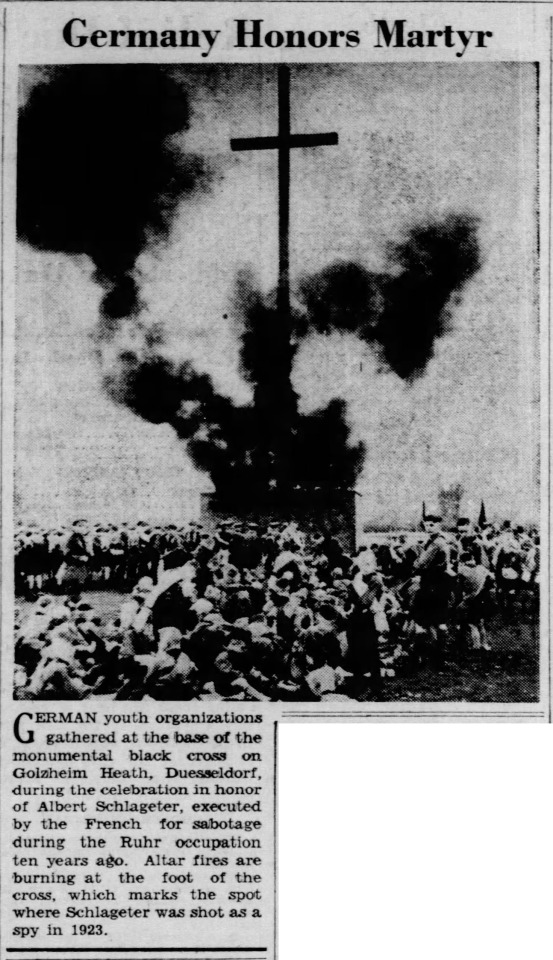
"Germany Honors Martyr," Border Cities Star. June 8, 1933. Page 6.
---
GERMAN youth organizations gathered the monumental black cross on Golzheim Heath, Dusseldorf, during the celebration in honor of Albert Schlageter, executed by the French for sabotage during the Ruhr occupation ten years ago. Altar fires are burning at the foot of the cross, which marks the spot where Schlageter was shot as a spy in 1923.
#albert leo schlageter#dusseldorf#occupation of the ruhr#golzheim#nationalist martyr#german nationalism#spy vs spy#altar fires#nazi seizure of power#german history#nsdap#interwar period
1 note
·
View note
Photo

Map of Proposed Boundaries of Germany after WW2, including the actual border changes and occupation zone borders.
An American map titled "Germany: Zones of Occupation." The map shows American, British, French, and Soviet occupation zones, including joint administration areas such as the Bremen Enclave and Berlin. An attached sheet, hiding portions of the map and the legend, refer to the "Polish-German Frontier" and details border proposals east of the Oder-Neisse Line, the area covered by each proposal, and the populations within as of 1939. Annotations, in red pencil, highlight the Ruhr and Saar areas with an additional line indicating a proposed railroad line near Aachen, Germany.
91 notes
·
View notes
Text
Thank you @kuro-anko for these screenshots, we need more people like you who knows how to make these types of things.
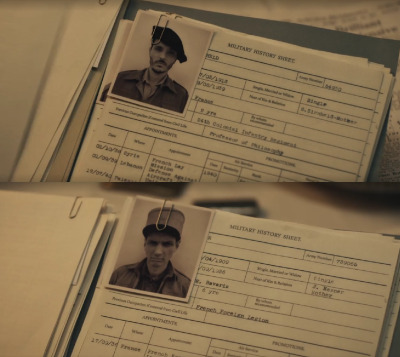
If the quality isn’t good enough I can tell what I could make out:
André Zirnheld.
Army Number: 54930.
Date of Birth: X7 / 03 / 1913.
Date of Entry into Service: X9 / 08 / 1939.
Status: Single.
Next of Kin: S. Zirnheld - Mother.
Next of Kin Address: X. France
Previous years served in the military: 2 yrs.
Prevous Regiment Served in: 24th Colonial Infantry Regiment.
Previous Occupation if entered from Civil life: Professor of Philosophy
Walter Essner.
Army Number: 739065.
Date of Birth: 19 / 04 / 1909
Date of Entry into Service: 17 / 09 / 1936
Status: single
Next of Kin: J. Essner - Mother
Next of Kin Address: Abenberg, Bavaris
Previous years served in the military: 6 yrs
Previous Regiment Served in:
Previous Occupation if entered from Civil Life: X
Appointments: 17 / 09 / 36. France. French Foreign Legion
Some math: André was born in 1913, according to Wikipedia the Free French became a part of the SAS on January 1st 1942, this would mean that he is about 28 years and 9 months old, give or take. He was 1 years old when WWI started, 5 years when it ended and 25 when he joined the military in 1939, the same year as WWII started.
Doing the same with Essner and we get that he is 32 years and 8 months, ish. He was 5 when WWI broke out, 9 when it ended and 27 when he joined the military in 1936, 3 yrs before WWII started. This means that Essner had aproximately 9 years between him turning 18( which I assume was the standard age for a young man to move out in the early 19s if not earlier) and him joining the military to do whatever he wanted. Now the thing that is bugging me is that there was no info in his paper about occupation, this is not actually too weird, he joined the military before the war and the paper only includes occupation if the soldier led a civil life before the WWII, but I still wonder what he was up to during those years and Augustin joined the military 1 yr before the war begun and his occupation is still listed.
Another thing that struck me was that Essner was maybe 12 when the hyper inflation in Germany really took off( old enough to remember), even though the financial state of Germany had been wobbly since the beginning of WWI, this means he lived a number of years of his younger life as part of a population that lived in general misery and struggled with everyday life. At the time the blame for Germany’s misery fell on France and its occupation of Ruhr, and one might think that someone who grew up like that would house at least some resentment towards said country, yet Essner stays loyal to his french friends.
Ok the first time he was deployed with the french he might have been bitter towards the french, or not, WHO KNOWS, im just rabling!
28 notes
·
View notes
Text
Events 1.11 (before 1940)
532 – Nika riots in Constantinople: A quarrel between supporters of different chariot teams—the Blues and the Greens—in the Hippodrome escalates into violence.
630 – Conquest of Mecca: The prophet Muhammad and his followers conquer the city, and the Quraysh association of clans surrenders.
930 – Sack of Mecca by the Qarmatians.
1055 – Theodora is crowned empress of the Byzantine Empire.
1158 – Vladislaus II, Duke of Bohemia becomes King of Bohemia.
1569 – First recorded lottery in England.
1654 – Arauco War: A Spanish army is defeated by local Mapuche-Huilliches as it tries to cross Bueno River in Southern Chile.
1759 – The first American life insurance company, the Corporation for Relief of Poor and Distressed Presbyterian Ministers and of the Poor and Distressed Widows and Children of the Presbyterian Ministers (now part of Unum Group), is incorporated in Philadelphia, Pennsylvania.
1779 – Ching-Thang Khomba is crowned King of Manipur.
1787 – William Herschel discovers Titania and Oberon, two moons of Uranus.
1805 – The Michigan Territory is created.
1861 – American Civil War: Alabama secedes from the United States.
1863 – American Civil War: The three-day Battle of Arkansas Post concludes as General John McClernand and Admiral David Dixon Porter capture Fort Hindman and secure control over the Arkansas River for the Union.
1863 – American Civil War: CSS Alabama encounters and sinks the USS Hatteras off Galveston Lighthouse in Texas.
1879 – The Anglo-Zulu War begins.
1908 – Grand Canyon National Monument is created.
1912 – Immigrant textile workers in Lawrence, Massachusetts, go on strike when wages are reduced in response to a mandated shortening of the work week.
1914 – The Karluk, flagship of the Canadian Arctic Expedition, sank after being crushed by ice.
1917 – The Kingsland munitions factory explosion occurs as a result of sabotage.
1922 – Leonard Thompson becomes the first person to be injected with insulin.
1923 – Occupation of the Ruhr: Troops from France and Belgium occupy the Ruhr area to force Germany to make its World War I reparation payments.
1927 – Louis B. Mayer, head of film studio Metro-Goldwyn-Mayer (MGM), announces the creation of the Academy of Motion Picture Arts and Sciences, at a banquet in Los Angeles, California.
1935 – Amelia Earhart becomes the first person to fly solo from Hawaii to California.
0 notes
Text
On this day in Wikipedia: Tuesday, 26th September
Welcome, Bienvenue, Benvenuta, שלום 🤗
What does @Wikipedia say about 26th September through the years 🏛️📜🗓️?

26th September 2019 🗓️ : Death - Jacques Chirac
Jacques Chirac, French politician, President of France (b. 1932)
"Jacques René Chirac (UK: , US: , French: [ʒak ʁəne ʃiʁak] ; 29 November 1932 – 26 September 2019) was a French politician who served as President of France from 1995 to 2007. Chirac was previously Prime Minister of France from 1974 to 1976 and from 1986 to 1988, as well as Mayor of Paris from 1977..."
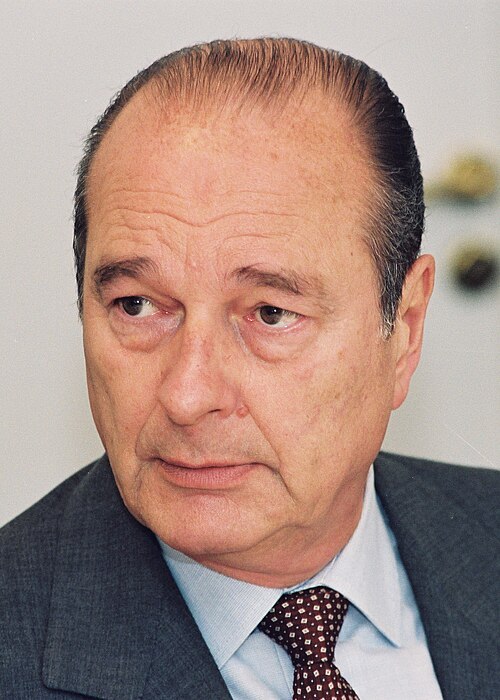
Image licensed under CC BY 4.0? by Christian Lambiotte
26th September 2016 🗓️ : Death - Toughie (frog)
Toughie, last known Rabbs' fringe-limbed treefrog (h. fl. 2005)
"Toughie was the last known living Rabbs' fringe-limbed treefrog. The species, scientifically known as Ecnomiohyla rabborum, is thought to be extinct, as the last specimen—Toughie—died in captivity on September 26, 2016. ..."

Image licensed under CC BY 2.0? by Brian Gratwicke from DC, USA
26th September 2013 🗓️ : Death - Mario Montez
Mario Montez, Puerto Rican-American actor (b. 1935)
"René Rivera, (July 20, 1935 – September 26, 2013), known professionally as Mario Montez, was one of the Warhol superstars, appearing in thirteen of Andy Warhol's underground films from 1964 to 1966. He took his name as a male homage to the actress Maria Montez, an important gay icon in the 1950s and..."

Image licensed under CC BY-SA 3.0? by Michael Bidner
26th September 1973 🗓️ : Event - Concorde
Concorde makes its first non-stop crossing of the Atlantic in record-breaking time.
"The Aérospatiale/BAC Concorde () is a retired Franco-British supersonic airliner jointly developed and manufactured by Sud Aviation (later Aérospatiale) and the British Aircraft Corporation (BAC). Studies started in 1954, and France and the UK signed a treaty establishing the development project on..."

Image licensed under CC BY-SA 3.0? by Eduard Marmet
26th September 1923 🗓️ : Event - Occupation of the Ruhr
The German government accepts the occupation of the Ruhr.
"The Occupation of the Ruhr (German: Ruhrbesetzung) was a period of military occupation of the Ruhr region of Germany by France and Belgium between 11 January 1923 and 25 August 1925. France and Belgium occupied the heavily industrialized Ruhr Valley in response to Germany defaulting on reparation..."
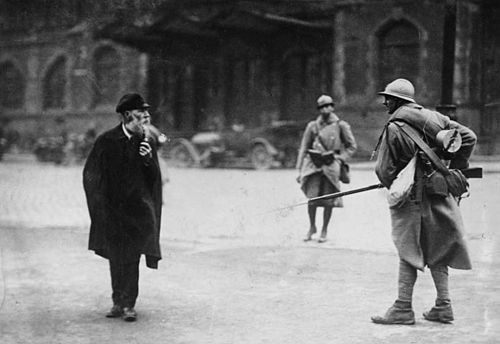
Image licensed under CC BY-SA 3.0 de? by
UnknownUnknown
26th September 1820 🗓️ : Birth - Ishwar Chandra Vidyasagar
Ishwar Chandra Vidyasagar, Indian philosopher, painter, and academic (d. 1891)
"Ishwar Chandra Bandopadhyay CIE, popularly known as Ishwar Chandra Vidya Sagar (Bengali: ঈশ্বরচন্দ্র বিদ্যাসাগর, lit. 'Vidyasagar, the Sea of Knowledge)'; (26 September 1820 – 29 July 1891), was an Indian educator and social reformer of the nineteenth century. His efforts to simplify and modernise..."
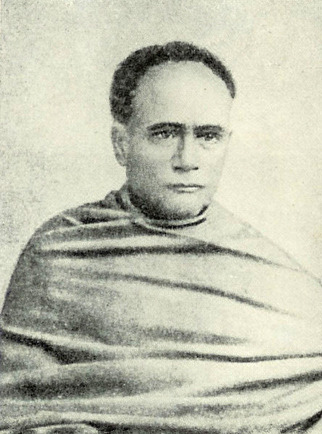
Image by Unknown authorUnknown author
26th September 🗓️ : Holiday - Christian feast days: Nilus the Younger
"Nilus the Younger, also called Neilos of Rossano (Italian: Nilo di Rossano, Greek: Όσιος Νείλος, ο εκ Καλαβρίας; 910 – 27 December 1005) was a Griko monk and abbot from Calabria. He was the founder of Italo-Byzantine monasticism in southern Italy. He is venerated as a saint in the Eastern Orthodox..."

Image by GJo
0 notes
Photo
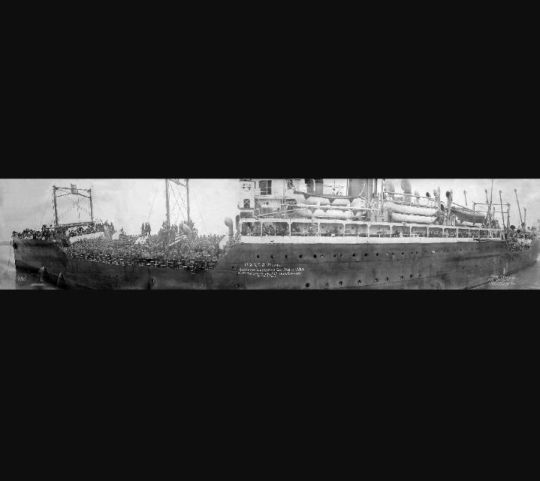
"The United States' Final World War One Centennial" 100 Years Ago, Today - (Wednesday Janaury 25th, 1923, Antwerp, Belgium: A mission ends. It began approximately 5 years and 7 months earlier when the first Soldiers of the American Expeditionary Force landed in France on June 26th, 1917, to join the Allies in The Trenches of the Western Front. Now, it is over. Their occupation duty finally over, the 1,000-odd men of the US Army's 8th Infantry Regiment file up the gangplank and onto the US Army Transport "St. Miehel." They are the last vestige of over 2 million men - and women - deployed to Europe to help end World War One. The scene is captured in the amazing first image we have here, fuzzy as it may be. Following the end of hostilities, American and Allied forces settled in on "Occupation Duty," where the victorious forces moved into Germany, and monitored disarmament and the opening stages of the rules set forth in the Treaty Of Versailles. (Photo 4; undated shot of American troops on Occupation Duty) Over the next four years, the American force slowly dwindled as the men rotated home. De Only a token force was left, garrisoned at the Ehrenbreitstein Fortress in Coblenz, Germany. Despite successful American goodwill with the German people, the situation with Germany and the other Allies grew dark as Germany failed to live up to its Treaty agreements. The Allies quickly occupied the Ruhr Valley in early Janaury of 1923. US President Warren G. Harding saw fit to bring the Boys home, signing the orders in early January, and the 8th Infantry Regiment packed up. On Jan. 24th, American Soldiers brought down the American Flag over Ehrenbreitstein Fortress for the last time, turning the fortification over to their French counterparts. Marching to the Coblenz train station, they prepared for the first 150 mile leg of their trip home. As the train pulled out, the band of the French 156th Infantry Division played "La Marseillaise"... and the Star-Spangled Banner" The following day, the 8th Infantry Regiment was onboard the St. Miehel, and the American Mission in Europe was over. ...21 years, 4 months and 13 days later, American Soldiers would be back. (at Fort Hancock, New Jersey) https://www.instagram.com/p/Cn3MOOBNg6p/?igshid=NGJjMDIxMWI=
0 notes
Text
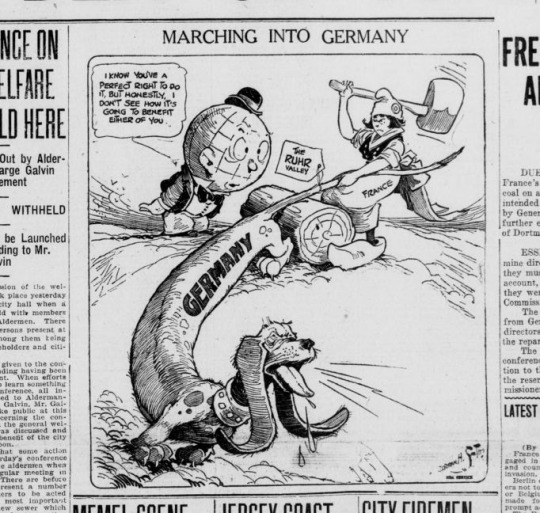
Marching into Germany - cartoon in an American newspaper on this day 1923. It refers to the French occupation of the Ruhr Valley in Germany.
Source: https://chroniclingamerica.loc.gov/lccn/sn85035720/1923-01-15/ed-2/seq-1/
1 note
·
View note
Text
Occupation of the Ruhr, Warsaw Ghetto Uprising Begins
Occupation of the Ruhr, Warsaw Ghetto Uprising Begins
To explore these themes, check out the complete films showcased in this video here: 100 Years – Occupation of the Ruhr https://www.britishpathe.com/workspaces/df699ffd537d4e0c74710ad015dfd64d/vJRkcrfG 80 Years – Casablanca Conference https://www.britishpathe.com/workspaces/df699ffd537d4e0c74710ad015dfd64d/lQgWn0SB 70 Years – Tito Becomes President of Yugoslavia…
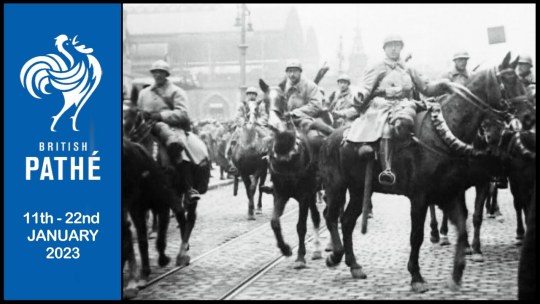
View On WordPress
0 notes
Text
Il y a 100 ans
Janvier-Février 1923 - des Annales de Lyre No. 192.
1.
REVUE DE MOIS
Du 10 octobre 1922 au 11 février 1923
______________
FRANCE
11 novembre. – Fête de la Victoire. Fête de l’Union, dans tous les centres importants. – A Rouen, le 12, admirable manifestation patriotique…
2-4 décembre. – Grève des boulangers de Paris. Résultat : un petit four.
27. – Centenaire de Pasteur, le grand savant …
11. – A la Chambre et au Sénat, approbation à l’immense majorité, de la politique de Poincaré à l’égard de l’Allemagne. Le parti radicale même ses voix au parti de l’Entente Républicaine.
AUTRES PAYS
ETATS-UNIS. – 13 novembre – 10 décembre. Tournée triomphale de notre vieux « Tigre » Clémenceau. Il établit éloquemment que c’est l’intérêt du monde et des Etats-Unis eux-mêmes qu’ils nous soient fidèles.
ANGLETERRE. – 19 octobre. – Démission de Lloyd George. (Enfin !) – 24 novembre, Ministère Bonar Law. Favorable à la France ? En tout cas, pouvant avoir besoin de la France, il lui laisse les mains libres.
ITALIE. – 30 octobre. Le parti national les « fascistes » porte son chef Mussolini au ministère. Celui-ci demande aux Chambres et en obtient pleins pouvoirs.
ALLEMAGNE. – 24 novembre. Ministère Cuno. Les manquements successifs et volontaires de l’Allemagne à ses engagements du Traité de Versailles sont proclamés par la Commission des Réparations.
11 janvier. – Occupation de la Ruhr par la France et la Belgique réunies, sous la direction du général Degoutte. – Grévistes des Postes et des chemins de fer remplacés par des employés français. – Sanctions de plus en plus sévères. – Mais, il ne s’agit que d’une « opération de police ». L’Allemagne refusant de nous payer, nous nous payons nous-mêmes.
TURQUIE. – 10 octobre. Accord de Moudania entre les Turcs, les Grecs et les Alliés. – 21 novembre. Déchéance du sultan Mehemet VI, qui s’enfuit à Malte. Son successeur, Abdul-Medjid, avec seulement les pouvoirs religieux du Khalife. – 5-10 février. Après l’échec de la Conférence de Lausanne, les Turcs menacent les Alliés. Enthousiasmés de leur victoire, soutenus par les Russes, mesurant notre faiblesse à nos concessions, ils espèrent bien reprendre ce que la guerre leur avait fait perdre …, et davantage.
Janvier-Février 1923 - des Annales de Lyre No. 192.
2.
LA FÊTE DE 11 NOVEMBRE
à la Neuve-Lyre
La Commission des fêtes avait fixé la cérémonie civile précisément à l’heure de la grand’messe. : décision regrettable, car, en obligeant les familles à choisir entre la cérémonie civile et la cérémonie religieuse, elle les contrariait presque toutes. Du reste, un certain nombre d‘entre elles seraient venues, de préférence, au service célébré pour leurs soldats et ainsi un jour, qui devait être une fête d’Union, serait devenue une manifestation de désunion.
M. le Curé ne pouvait pas supprimer le service qu’il avait annoncé. S’excusant auprès des familles, que ce changement d’heure dérangeait, mais résolu avant tout à sauvegarder l’Union sacrée, il avança son office à 8 h. ½, de sorte que chacun put se rendre à la cérémonie qu’il voudrait – ou aux deux.
In n’en eut pas à s’en repentir, comme on va le voir. Nous n’oserions en dire autant du rédacteur d’un journal, qui avait été informé aussitôt de la décision de la Commission et qui prédisait, le 10 novembre, quelle serait la « colère » du Curé de ce qu’on n’assisterait pas à la messe. Ce rédacteur se figurait évidemment qu’un piège avait été tendu au Curé de la Neuve-Lyre et que celui-ci y tomberait : il se réjouissait trop vite.
La Cérémonie religieuse fut très solennelle : Eglise tendue de deuil. Assistance nombreuse et recueillie. Au pied du Mémorial, encadré de lauriers, des croix casquées rappelant les tombes du front. Autour du catafalque, où nos pompiers rendaient les honneurs, des représentants de toutes les familles de nos morts.
Mlle Catherine Z…, à l’orgue, joua plusieurs airs de Chopin, aussi brillants que graves et sa sœur, Mlle Madeleine interpréta, avec le talent qu’on lui connaît, le si expressif Pie Jesu de Stradella.
Avant l’absoute, M ; de Curé donna lecture d’un de ses poèmes d’Espérance : Ce que dit l’Ange de Lyre. Puis l’on se rendit dans le plus grand ordre au cimetière ou le De Profundis fut chanté, au milieu de bien des larmes : malgré l’éclat des tombes, on le prendrait pour un coin du front, ce côté de notre cimetière.
La Cérémonie civile eut lieu ensuite. A 10 h. ¼ , sur la place de la Mairie, le cortège se forma, précédé par les pompiers, les enfants des écoles, - constitué principalement par les familles des morts, le Conseil municipal et les Anciens Combattants, - et suivi d’une vingtaine de personnes.
Le cortège, après une pause au cimetière, s’en vint aux pieds du Monument. Là, une très belle couronne offerte par la Municipalité, plusieurs autres et des fleurs furent déposées. M. le Maire lut le discours de circonstance qu’il termina par le mot d’ordre : Mort à la guerre ! Le passage le plus émouvant fut celui où il demanda une minute de silence en l’honneur de nos morts. On sait que ce silence reproduit celui que l’Eglise a introduit dans sa liturgie, à la cérémonie de l’absoute…
Le discours de M. le Maire achevé, le cortège se rendit à son point de départ, où il se disloqua. Le soir, à cause du mauvais temps, la fête fut gâtée. – Espérons qu’il fera meilleur les années prochaines.
Vive la France !
______________
TERRIBLES MALHEURS
L’accident de Neaufles. – entre Le Coq et l’Hermite. – 6 novembre. M. V., entrepositaire à Rugles, allait livrer une barrique de vin à la Neuve-Lyre ; il conduisait sa camionnette, ayant près de lui son employé M. R. Marchait-il à une allure trop vive ? Freina-t-il trop brusquement ? La camionnette fut entièrement retournée. M. Bruno, maire de Neaufles, et M. G., débitant, accourus au bruit de l’accident, trouvèrent le fond de l’auto dans un fossé, la capote dans l’autre. M. R. gisait inerte près de l’avant, dans une mare de sang. M. V., assis sur le bord du fossé, paraissait inconscient. Quand on lui avait lavé la figure et montré le cadavre de R., il s’écria comme fou : « J’ai tué mon commis ! » - Il le criait encore quand le Dr. B. le fit conduire à Laigle pour être trépané. Il succomba peu après, sans qu’on ait pu obtenir que cette parole : « J’ai tué mon commis ! » …
L’incendie de la Vieille-Lyre. – 17 décembre. De la jolie maison bourgeoise de la Croix de Pierre, il ne reste plus qu’une triste ruine.
M. et Mme. B étaient absents, le père de Mme. B, M. P., couchait au premier auprès de l’un de ses petits-enfants ; la bonne, Marguérite L., dix-huit ans, originaire de l’Orne, avait sa chambre au second. Elle avait allumé un bon feu dans la chambre de ses maîtres, pensant qu’ils renteraient dans la nuit du 16.
A 3 heures du matin M. P., réveillé par la fumée, s’aperçoit qu’il y a incendie. Vite il descend, son petit garçon dans les bras, tout en criant : « Marguerite ! sauve-toi, il y a le feu ! » Il revint presque aussitôt. Le feu gagnait déjà l’escalier. Et voici que, l’ayant descendu à travers les flammes, la malheureuse Marguerite s’en vint tomber comme une torche vivante et hurlante, aux pieds du vieillard. Celui-ci l’éteignit vite dans des manteaux de linge qui se consumait sur elle et la transporta chez M. L. C’est là qu’elle fut pansée et bandée d’ouate, des pieds à la tête, par le Dr. Morand, avec le calme et la dextérité qu’il a eu trop souvent à déployer pendant la guerre, dans des cas analogues. A 7 heures, elle fut transportée en auto à l’hospice de Laigle. Mme D. s’occupait d’elle pendant le trajet. Il faut dire que depuis plusieurs heures elle ne criait plus, elle ne souffrait plus. Elle se plaignait d’avoir froid. Les brûlures, sur les trois quarts du corps, avaient tué les nerfs de la sensibilité. – Elle mourut à Laigle, vers 11 heures, après avoir reçu les sacrements…
MARCHÉS
Lyre. – 19 février. Pain, 1 fr. 10 le kilogr. – Beurre, 7 fr. 50 le demi-kilogr. – Oufs, 4 fr. 25 la douzaine.
Les principales denrées avaient augmenté de trois fois en moyenne après la guerre. Elles avaient diminué notablement en 1922. Elles sont de nouveau à la hausse.
Le prix des pommes a oscillé entre 5 et 7 francs le demi-hectolitre.
Etat de la plaine. – Tempêtes violentes 29-31 décembre. Depuis quatre mois, pluies ou brumes. Temps doux, qui fait pousser trop tôt les bourgeons et n’est guère favorable au blé.
0 notes
Text
French Occupy Düsseldorf

Allied soldiers on parade in Düsseldorf.
March 8 1921, Düsseldorf--The Treaty of Versailles did not specify the amount Germany would have to pay in war reparations, but deferred the decision on the exact amount until May 1921; in the meantime, Germany would pay 20 billion gold marks and large quantities of coal and chemicals. With that deadline fast approaching, however, no agreement had been reached, or even seemed close; the Allies had proposed a figure of 226 billion gold marks in January, whle the Germans countered with 30 billion.
To back up their demands, on March 8, 15,000 French and Belgian troops occupied Düsseldorf and Duisburg; the British signed off on the operation but only provided a handful of troops themselves. The French claimed that the lowball German figure meant that the “German Government does not wish to fulfill the engagements it assumed in signing the treaty.” German President Ebert understandably protested:
Our opponents in the World War imposed upon us unheard-of demands, both in money and in kind, impossible of fulfillment. Not only ourselves but our children and grandchildren would have become the work-slaves of our adversaries by our signature. We were called upon to seal a contract which even the work of a generation would not have sufficed to carry out.
We must not and we cannot comply with it. Our honor and self-respect forbid it.
With an open breach of the Peace Treaty of Versailles, our opponents are advancing to the occupation of more German territory.
We, however, are not in a position to oppose force with force. We are defenseless....
Fellow-citizens, meet this foreign domination with grave dignity. Maintain an upright demeanor. Do not allow yourselves to be driven into committing ill-considered acts. Be patient and have faith.
#wwi#ww1#ww1 history#ww1 centenary#world war 1#world war one#world war i#The First World War#The Great War#march 1921#ruhr#occupation of the rhineland#occupation of the ruhr#Treaty of Versailles#germany
16 notes
·
View notes
Quote
We knew what it was like to feel humiliated after a defeat. Because we lived on the left bank of the Rhine, which was under Allied occupation, between 1919 and 1926 we saw Canadian, British and then French troops – chiefly drawn from the colonies – march past. These six years of peacetime occupation were long and burdensome. For Germans, the situation was incomprehensible: enemy troops had not entered the country on the western frontier, there had been no invasion during the war, and now it was the peace treaty, a treaty considered unjust and designed to ruin the country, that brought about foreign occupation. A period of occupation, even a tranquil one, is hardly likely to strengthen friendship among peoples. The occupation of the Ruhr from 1923 to 1926 was accompanied by violence and turmoil, and resulted in 121 summary executions and tens of thousands of expulsions, and it led to a general strike – at the instigation of Chancellor Cuno – and the economic collapse of the industrial heart of Germany, bringing on terrifying inflation. All that, I think, accentuated the Rhinelanders' already very strong prejudice against the French, who had been seen for centuries as troublesome neighbours.
The humiliations inflicted by the occupying forces did not escape my notice when I was a child. I remember that my parents had been forbidden to attend the burial of my grandmother, on the pretext that my father was a reserve officer. I also recall how we congratulated Father Seelen, who had dared to sing the German national anthem, which was strictly prohibited on the left bank, in full view of the French troops. Fortunately Father Seelen was a Dutch citizen, and the French could not arrest him. That is how, as young men, we practised a kind of resistance that was within our capabilities.
Operation Valkyrie: The Plot to Kill Hitler
#history#military history#politics#german politics#ww1#treaty of versailles#occupation of the ruhr#occupation of the rhineland#germany#weimar germany#france#wilhelm cuno
6 notes
·
View notes
Note
So Hitler had promised Hindenburg that he would restore the monarchy, which he never did or ever planned to do. My question is this, if Hindenburg was such a monarchist, why didn’t he just restore the monarchy himself? Did he want to wait until Germany was in a strong economic, political, and military position to support a restoration or was there another reason?
@stefansasse and I went over that a little bit in our Weimar podcast. As President, Hindenberg swore an oath to uphold the structures of Weimar democracy, and his honor (and the public perception if he would break it) mattered significantly to him. Similarly, the Kaiser was in exile in the Netherlands, and was unlikely to let him return to Germany. With the Reichswehr as gutted as it was under the Treaty of Versailles such as they saw in the Occupation of the Ruhr, Hindenberg wouldn't have been able to force the issue had France decided to involve itself, so instead Weimar continued to secretly rearm. Similarly, an attempt to return to the monarchy probably wouldn't have been looked on favorably by the Americans, and American investment was actually helping Germany out quite a bit getting unemployment under control and other things that helped maintain political stability and undercut the KPD and the NSDAP.
Thanks for the question, Anon.
SomethingLikeALawyer, Hand of the King
61 notes
·
View notes
Photo

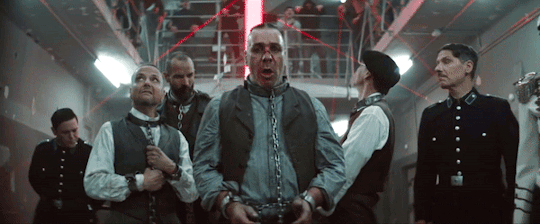
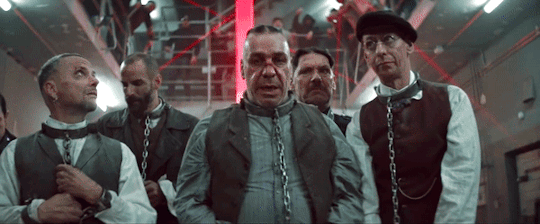

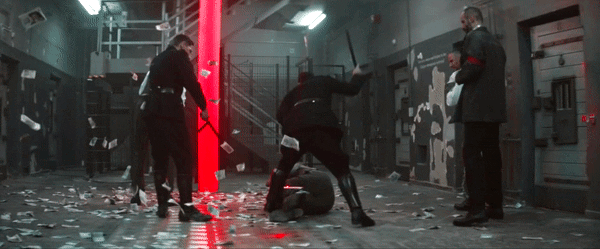
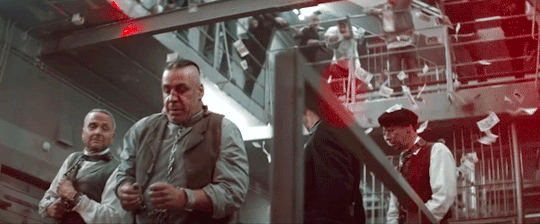
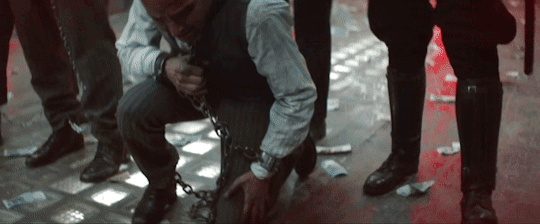

DeutschlandMV dissection :
“Ich will dich nie verlassen.[...]
Überheblich, überlegen
Übernehmen, übergeben
Überraschen, überfallen”
Deutsche Inflation 1914 bis 1923 / Hyperinflation in the Weimar Republic
Hyperinflation affected the German Papiermark, the currency of the Weimar Republic, between 1921 and 1923, primarily in 1923. It caused considerable internal political instability in the country, the occupation of the Ruhr by France and Belgium as well as misery for the general populace.
Crash of 1929
78 notes
·
View notes
Photo
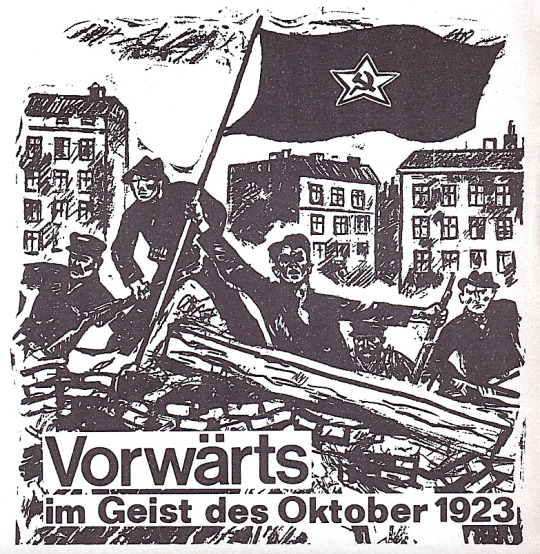
The ‘German October’
“In late July, what amounted to a wait-and-see approach was superseded by a policy of preparing for the ‘German October’. On 9 August, after the ECCI had received reports detailing the depth of the revolutionary crisis in Germany, Stalin convened a meeting of the Russian Politburo. Then, on 12 September, the Cuno government fell – and with it the policy of resisting the Franco-Belgian occupation – amidst a wave of strikes in which the Kommunistische Partei Deutschlands had played a significant role. The ‘German October’ now seemed to be a real possibility, even reviving hopes of world revolution.
At the series of meetings which ensued, the Russian Politburo drew up a plan for revolution and then, in the forum provided by the ECCI, consulted the French and Czechoslovakian parties, in addition to the KPD leadership, to which Thälmann now belonged. At one of the secret sessions in late September, the French delegate, Cachin, expressed anxieties about how a de facto alliance with German nationalism in a ‘revolutionary war’ against France would impact on his party’s supporters. Trotsky’s reply was that, ‘It is too early for sleepless nights over the Ruhr. The point is to firstly take power in Germany […] everything else will derive from that’.
The Ruhr, however, was not to be to the launch pad for the ‘German October’; revolution was to be ignited using the ‘united front’ tactic in central Germany.68 According to Moscow’s plan, the KPD would enter ‘workers’ governments’ in Saxony and Thuringia. These were the locations where the party had ‘tolerated’ left SPD administrations throughout 1923, enabling the Proletarian Hundreds – which were to fight as armed units in the anticipated civil war – to operate legally at a time when they were banned by the right SPD-led Prussian government. A general strike with left SPD support would then be declared and this would signal the armed uprising.
Yet, even now, differences over tactics continued to shape the responses of the KPD leadership. During the discussions in Moscow, Thälmann expressed reservations about the revolutionary potential of Brandler’s ‘united front’ policy. He spoke against Brandler’s assessment of the influence of the left SPD and the likelihood of their supporters coming over to the side of revolution, and he questioned the value of entering regional Diets in order to procure arms. The latter was the key issue. While Brandler had stated that there were 250,000 men organised in the Proletarian Hundreds, Thälmann stressed that they were largely unarmed and, thus, militarily useless.
The success of the German revolution would, therefore, depend on Soviet intervention. In early October, shortly before his return to Hamburg, Thälmann concluded: ‘The party is not ideologically and politically prepared for the most important matter of the revolution, the civil war’.
Initially, developments proceeded without complication as the KPD entered the Saxon and Thuringian governments in mid-October. Then, on 20 October, the new Reich government under Chancellor Gustav Stresemann, which included SPD Ministers, declared a state of emergency, passed political power to the military and dispatched troops into central Germany to depose these ‘workers’ governments’. The KPD and its Soviet advisers, who had relocated to Dresden, were left to improvise a response in a fast-moving and unanticipated situation.
That evening, the leadership and its Soviet advisors resolved to use a meeting between Communist and left SPD activists, which was scheduled for the following day, ostensibly to identify the level of support for a general strike protesting the actions of the Reich government. Their actual aim was to assess the readiness of the proletariat for the German revolution. But the outcome of the so-called Chemnitz Conference’ was negative. Speaking for the SPD, the Saxon Minister of Labour, Georg Graupe, refused to countenance an immediate general strike and, instead, proposed setting up a commission of both parties to decide on what action to take. This, according to the 140 weimar communism as mass movement KPD’s leading theoretician, August Thalheimer, gave the revolution a ‘third-class funeral’.
The Hamburg Rising
Despite Thälmann’s reservations in Moscow about the prospects for a successful ‘German October’, the only attempted uprising in 1923 took place in Hamburg. It was based on an initially effective military-technical plan, especially when compared with the uncoordinated ‘March Rising’ of 1921, and took the city’s police force by surprise – despite the KPD’s public trumpeting of the coming revolution.
At 5am on 23 October, members of the party’s Ordnerdienst – the militarily-trained inner core of the Proletarian Hundreds – stormed police stations in the city’s suburbs, rapidly overpowering seventeen of twenty-six of them, in order to seize firearms. These units then took up position on rooftops, inside buildings and behind barricades. At the same time, Combat Groups (Kampfgruppen) had gone into the night with the intention of obstructing the arrival of reinforcements by blocking arterial roads and intercity railway lines, cutting telephone cables and dividing the city by occupying bridges over the river Alster. The expectation was that once the city’s working-class suburbs had been taken, the insurgents would move on the city centre in concentric circles, drawing with them wider popular support.
After returning from Moscow in early October, Thälmann’s was main role was political: he was responsibility for the agitation which aimed to bring about a mass movement.
Over the course of almost three days, the Hamburg KPD – with limited numbers of firearms and at most a few hundred insurgents – fought a losing battle against some 6000 well-armed members of the city’s police, which drew on military reinforcements, and 800 members of the SPD’s combat organisation, Republik. By the end of the uprising, more than 100 were dead, seventeen of them police officers, and several hundred more – many of them passersby – were wounded. Had the Hamburg KPD not carried out the leadership’s order to ‘retreat’, there would have been a massacre of party activists.
Although there had been significant support for the rising among the residents of Eimsbüttel, Barmbek, and Schiff bek – which marked the epicentre of events – it remained a putsch without wider support in the workforce, even in the giant shipyards. A dockers’ strike, which began on 20 October, resolved the following day to call a general strike when workers became aware that the military had been sent into central Germany, but this was stalled by the SPD-led trade union leadership in Hamburg. The KPD’s support in the local unions and the high levels of animosity towards the actions of the SPD Ministers in the Reich government had not turned into support for revolution.
Despite the more recent availability of secret communist documentation – in addition to police records and party circulars – it remains very much easier to reconstruct the specific events that took place than the internal-party dynamics that allowed them to happen. The most likely interpretation is that it grew out of a confusion of central and local party responses to a series of unanticipated circumstance. Since the fall of the Cuno government in September, the KPD had been placed on a nationwide state of readiness for the German revolution.
In early October, a political committee was set up in Wasserkante, in which Urbahns was the political leader, (probably) Gustav Faber was responsible for organisation, and Rudolf Hommes liaised with the Military-Political Directorate (Oberleitung) responsible for north-western Germany. The latter was headed by Albert Schreiner and his Soviet military advisor, General Moishe Stern. Urbahns then travelled to the Chemnitz Conference as the district’s representative. However, in the expectation that the left SPD would adopt Brandler’s call for a general strike, some twenty-five to thirty couriers were dispatched nationwide with the message that the uprising was anticipated to take place no later than Tuesday 23 October.
Hermann Remmele was the courier sent to Kiel – the port town which began the November Revolution five years before – in order to investigate reports that it offered the best prospects for widening the revolution. But he stopped in Hamburg for talks with the regional military and political leadership. Here, he was persuaded that Hamburg presented the better option and, laying too much emphasis on the likelihood of a resolution in support of a general strike in Saxony, stressed that the party must be ready to ‘launch the attack’ within ‘one or two days’. Remmele then travelled on to Kiel, where he received the telegram to postpone events.
In Hamburg, confusion reigned: the uprising was launched in the belief that that military intervention against the ‘workers’ governments’ in central Germany and the strike in the docks marked the moment to begin, and once launched, the uprising was not so easy to call off, especially after the party’s military units had gone underground.
A number of accounts attribute personal responsibility to Thälmann for this bloody fiasco, as he was the highest official present at the time the decision was taken. His motivation is explained in terms of a lust for political power: expunging the competition of party rivals, above all Hugo Urbahns. Yet, none of the documentation states more than his political involvement in events – and these were events clearly under the command of the party’s military-technical apparatus and its Soviet advisors. At a meeting of the leadership held in Berlin as the rising was still underway in Hamburg, the topic was not any breach of discipline by Thälmann and the Hamburg leadership, but rather whether some form of assistance should be given to them. The final decision, in the words of the Solomon Lozovsky, who chaired the meeting, was: ‘If one does not come to the aid of Hamburg that is not a betrayal. We sacrifice a division to save an army’.”
- Norman LaPorte, “The Rise of Ernst Thälmann and the Hamburg Left, 1921-1923.” in Weimar Communism as Mass Movement 1918–1933. Edited by Ralf Hoffrogge and Norman LaPorte. Part of the Studies in Twentieth Century Communism Series. Chadwell Heath: Lawrence & Wishart, 2017. pp. 138-142.
The image is actually from the cover of Roter Morgen, a Maoist newspaper, which published a history of the Hamburg uprising in October 1969.
#hamburg#wasserkante#kommunistische partei deutschlands#world revolution#armed uprising#deutsches oktober#hamburger aufstand#left opposition#comintern#ultraleftism#proletarian hundreds#shipyard workers#putschism#spd#weimar germany#weimar republic#communists#communism#general strike#academic quote
2 notes
·
View notes
Text
Events 9.26 (before 1940)
46 BC – Julius Caesar dedicates a temple to Venus Genetrix, fulfilling a vow he made at the Battle of Pharsalus.
715 – Ragenfrid defeats Theudoald at the Battle of Compiègne.
1087 – William II is crowned King of England, and reigns until 1100.
1212 – The Golden Bull of Sicily is issued to confirm the hereditary royal title in Bohemia for the Přemyslid dynasty.
1345 – Friso-Hollandic Wars: Frisians defeat Holland in the Battle of Warns.
1371 – Serbian–Turkish wars: Ottoman Turks fought against a Serbian army at the Battle of Maritsa.
1423 – Hundred Years' War: A French army defeats the English at the Battle of La Brossinière.
1493 – Pope Alexander VI issues the papal bull Dudum siquidem to the Spanish, extending the grant of new lands he made them in Inter caetera.
1580 – Francis Drake finishes his circumnavigation of the Earth in Plymouth, England.
1687 – Morean War: The Parthenon in Athens, used as a gunpowder depot by the Ottoman garrison, is partially destroyed after being bombarded during the Siege of the Acropolis by Venetian forces.
1688 – The city council of Amsterdam votes to support William of Orange's invasion of England, which became the Glorious Revolution.
1777 – American Revolution: British troops occupy Philadelphia.
1789 – George Washington appoints Thomas Jefferson the first United States Secretary of State.
1799 – War of the 2nd Coalition: French troops defeat Austro-Russian forces, leading to the collapse of Suvorov's campaign.
1810 – A new Act of Succession is adopted by the Riksdag of the Estates, and Jean Baptiste Bernadotte becomes heir to the Swedish throne.
1905 – Albert Einstein publishes the third of his Annus Mirabilis papers, introducing the special theory of relativity.
1907 – Four months after the 1907 Imperial Conference, New Zealand and Newfoundland are promoted from colonies to dominions within the British Empire.
1910 – Indian journalist Swadeshabhimani Ramakrishna Pillai is arrested after publishing criticism of the government of Travancore and is exiled.
1914 – The United States Federal Trade Commission is established by the Federal Trade Commission Act.
1917 – World War I: The Battle of Polygon Wood begins.
1918 – World War I: The Meuse-Argonne Offensive began which would last until the total surrender of German forces.
1923 – The German government accepts the occupation of the Ruhr.
1933 – As gangster Machine Gun Kelly surrenders to the FBI, he shouts out, "Don't shoot, G-Men!", which becomes a nickname for FBI agents.
1934 – The ocean liner RMS Queen Mary is launched.
1936 – Spanish Civil War: Lluis Companys reshuffles the Generalitat de Catalunya, with the marxist POUM and anarcho-syndicalist CNT joining the government.
0 notes
Text
Les idées folles

Le public le regardait avec un air ahuri comme s’ils ne comprenaient pas ses paroles pourtant sincères. Les gens étaient habitués à écouter les propos d’un vieux mais ce jour, ils découvrirent un jeune curé robuste, calme, appelant à la vie et la paix. Louis aperçut quelques regards méfiants voire jaloux de la part de vieilles femmes acariâtres, il comprit plus tard, qu’elles lui en voulaient d’être en vie et pas leur fils parti et resté définitivement dans les tranchées. Il se sentait seul, se demandant si cela valait la peine de continuer. Surtout qu’il n’a jamais voulu devenir prêtre, obligé de suivre une tradition stupide ancestrale de sa famille noble. Son frère ainé récupérait l’héritage, son second frère entrait dans l’armée en devenant officier après des études à Saint Cyr, le troisième, son cas, finissait sa vie dans la théologie. Après la dernière prière, il remercia ses ouailles qui ne le connaissaient pas encore. Enfin, il pouvait s’occuper de sa passion.
En dehors des messes, il troquait sa soutane pour une tenue plus sportive, parcourant la campagne le plus anonymement possible avec son appareil photo. Il adorait prendre des clichés de paysages, il photographiait la campagne de part en part, profitant pour saluer les pêcheurs, fermiers, laboureurs ou simples piétons comme lui. Quelques paroissiens reconnurent le jeune curé malgré ses airs de reporter en vadrouille. Avec son pantalon de golf, les enfants l’appelèrent le frère Rouletabille, rappelant le héros de Gaston Leroux. Il adorait ce sobriquet comprenant avec lui qu’il était enfin accepté de sa communauté. D’ailleurs, par la suite, il put photographier les habitants de la ville le dimanche après la messe. Il les retrouvait au café en face de l’église à parler reconstruction, dettes de l’Allemagne, occupation de la Ruhr par les français et le retour des petits gars, anciens poilus dont pour certains, il manquait quelques chose : une jambe, un œil, un bras, le sourire, le bonheur, la vie. Il ne savait jamais quoi répondre dès qu’on parlait de la grande guerre car il ne l’avait pas faite à cause de son statut. Toutefois, il ne baissait jamais les yeux au moindre regard méprisant des anciens combattants même s’ils ne lui firent aucun reproche ; il savait qu’ils lui en voulaient.
Il surprit tout le monde en sympathisant avec le chef du parti communiste de la ville. Ils avaient en commun l’amour du sport, créant chacun une équipe de basket arrivé dans la région avec les soldats américains. Chaque dimanche après-midi, les habitants pouvaient supporter leurs enfants se confrontant dans des rencontres passionnantes sur l’ancien jeu de paume. Louis aimait photographier ces parties de basketball, cherchant à immortaliser ces beaux moments. Cela n’empêchait pas quelques vifs débats sur la vie politico-sociale, la canonisation récente de Jeanne d’Arc ou la grève des cheminots brisée par le gouvernement.
L’histoire pourrait en rester là ; il avait tout pour vivre une petite vie de curé de campagne. Cependant, sa domestique bien que fervente bigote était aussi une sacrée commère. Alors quand elle découvrit dans un tiroir du bureau pendant qu’elle faisait le ménage dans sa chambre, quelques photos d’une jeune femme à moitié nue, elle ne put s’empêcher de le raconter à toutes ses amies et à son mari qui balança l’info durant un apéro au café. La rumeur se répandit comme une trainée de poudre, apportant des doutes en apprenant que la jeune femme était la fille de l’homme le plus riche de la ville, un industriel propriétaire de la laiterie et de la conserverie.
Au cours des messes suivantes, les paroissiens s’amusèrent à les épier, cherchant à surprendre le moment complice, le regard qui se croise durant ses sermons. Il entendit parfois dans son dos des ’sales hypocrites’, voix de femme énervée parce qu’un curé, ça ne doit pas baiser! Au contraire, les hommes l’admirèrent étrangement car la jeune femme était belle et fortement désirable. De temps en temps, on cherchait à le faire boire, mais il ne parlait jamais, se contentant de photographier les habitants pendant leur travail ou prenant la pose. De même les gens n’arrivaient jamais à savoir quand ils se fréquentaient. Les curieux jouant les espions n’arrivaient jamais à les voir entrer ou sortir chez l’un ou l’autre. En fait personne ne savait qu’il existait un passage secret traversant la ville et reliait l’église au château domicile de la demoiselle. « Merci les ancêtres, merci les invasions ! » murmurait-il chaque nuit dans le tunnel à la lumière de sa torche. Et quand il ouvrait la porte, elle était là, tapie contre le mur à l’attendre. Chaque nuit, elle le serrait dans ses bras, puis silencieusement, ils partaient dans sa chambre pour faire l’amour et dormir l’un contre l’autre. Souvent ils se rappelaient leur première rencontre : Elle ne l’avait pas reconnue dans ses habits civils et appareil photographique accroché au cou. Elle l’accosta justifiant quelques questions techniques sur la photographie. Il prit son portrait. Puis ils continuèrent de se voir prétextant toujours l’art de la photo. Elle avoua ses sentiments durant une confession, le meilleur moment pour dire à un jeune prêtre qu’on est amoureuse de lui. Il était habitué, expliquant à chaque fois que l’idée était saugrenue, il représentait un idéal psychologique pour certaines, un amour chimérique, un fantasme pour les autres. Mais quand elle prononça ses mots, elle toucha son cœur. Il détestait ce métier, il aimait la photographie, il l’aimait elle !
De temps en temps, il utilisait son appareil pour la photographier dans certains moments plus ou moins intimes. Il aimait revoir les images d’elle en train de sourire, avec un air timide, presque gênée. Il aimait se servir de l’une d’elles, celle où elle est en sous-vêtements en train de lire comme marque-pages dans sa bible. Même si cela pouvait choquer, il se moquait de ce pêché.
La rumeur devint officielle quand une servante du château annonça que la belle était enceinte. Il y avait foule pour la messe suivante, tout le monde voulait l’entendre prêts à se moquer : étrange sentiment de raillerie mêlé au plaisir. On voulait voir la bête, le monstre ! En fait, rien n’arriva de particulier car il fit son office comme toujours. Seulement, après la messe, il ne vint pas au café pour discuter. Il ne vint pas non plus au traditionnel match de baskets des jeunes. Il préféra écrire une lettre de démission ainsi qu’une lettre à sa famille pour leur annoncer qu’il quittait la religion afin d’épouser la femme de sa vie. Un an plus tard, après la messe du nouveau curé, les paroissiens se rassemblèrent sur la place de l’église et écoutèrent le vieil Émile réciter un article du journal. C’était sur un curé devenu photographe-reporter. Ce jour-là, les habitants de la ville furent fiers de l’avoir eu comme curé. Il était comme de la famille, en plus il a épousé une fille du coin.
Alex@r660 – octobre 2019
26 notes
·
View notes